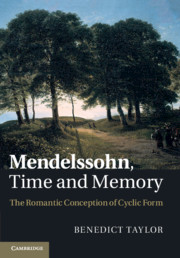2 - Musical history and self-consciousness
The Octet Op. 20
Published online by Cambridge University Press: 05 November 2011
Summary
Genieße mäßig Füll und Segen!
Vernunft sei überall zugegen,
Wo Leben sich des Lebens freut!
Dann ist Vergangenheit beständig,
Das Künftige voraus lebendig,
Der Augenblick ist Ewigkeit.
(Goethe, Vermächtnis)
Towards the end of the finale of Mendelssohn's Octet, the musical past becomes increasingly drawn into the present. Reminiscences of earlier movements are heard fleetingly amidst the seemingly irrepressible drive of the music to its final bars. In the central, developmental section of this movement's irregular structure, the theme of the quicksilver third-movement scherzo is caught three times, always in a new key, but is never securely held – and then ‘all has vanished’. The climactic coda – the apotheosis of the whole composition – unfurls in a series of three increasingly explicit references back to the music of the Octet's earlier movements. First comes a passage which sounds strangely familiar yet without being like anything previously heard in the finale, which manages to allude unmistakably to the Allegro moderato opening movement without ever quite quoting it. There follows a distant echo of the crisis that had befallen this movement's development section, whose darker hues had spilled out to form the slow movement – the insistent repeated minims and the revisiting of the C and F minor tonal areas of those two movements. Finally, the irrepressible sweep of this section is consummated by the explicit reappearance of the closing theme of the Allegro over the pulsating quavers of the finale's own closing theme. The finale and opening movement have closed and merged into one another, tying up the work with a return full-circle in an ecstatic meeting of parts to whole. The entire edifice has turned round on itself in one gigantic, interconnected organic system, which has grown away from and returned back into itself. Beginning and end, first and last, are one and the same.
It is the process of its own becoming, the circle that presupposes its end as its goal, having its end also as its beginning; and it is only by being worked out to its end, is it actual.
- Type
- Chapter
- Information
- Mendelssohn, Time and MemoryThe Romantic Conception of Cyclic Form, pp. 52 - 102Publisher: Cambridge University PressPrint publication year: 2011



